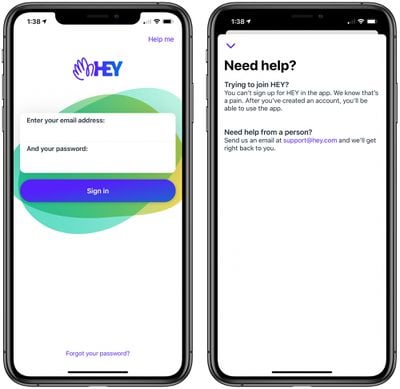Apple is not planning to change its App Store rules to accommodate the "Hey" email app that's at the center of a major discussion about Apple's App Store fees and rules, Apple marketing chief Phil Schiller told TechCrunch this afternoon.

Schiller says that there are "many things" that Hey's developers could do to make the app work within the existing App Store rules, and Apple would "love for them to do that."
Hey, an email app created by the team that developed Basecamp, is priced at $99 per year. Subscriptions for the service need to be purchased on the Hey website and are not offered in app because Hey's developers don't want to pay a 30 percent cut to Apple.
The current incarnation of the app offers no in-app purchases and no signup options. The app opens straight to a login screen that lets users know that they can't subscribe to the service in the app. Because Apple does not allow for outside links that skirt its in-app purchase options, Hey also offers no link to the website where users can sign up.
Schiller says that this is not an ideal app experience for users.
"You download the app and it doesn't work, that's not what we want on the store," says Schiller. This, he says, is why Apple requires in-app purchases to offer the same purchasing functionality as they would have elsewhere.
Apple does have a rule that requires apps that offer subscriptions and purchase options on the web and elsewhere to also provide in-app purchases so users can sign up right on an iPhone or an iPad, but the company makes an exception for "Reader" apps.
Netflix and Spotify, for example, have apps in the App Store where users can't sign up for their services in the app itself and must already have an existing account. Hey wanted to use the same exception as other "Reader" apps, which Apple views as apps that display external content like music, books, and movies, but Schiller says that Hey does not qualify as a "Reader" app.
"We didn't extend these exceptions to all software," said Schiller. "Email is not and has never been an exception included in this rule." According to Schiller, Apple made an error approving the original version of the Hey app, and it should have been rejected. Apple did actually reject Hey's Mac App Store app, but the iOS app slipped by.
TechCrunch's Matthew Panzarino asked Schiller if he expects Apple to get a portion of the revenue of every business that has an app, regardless of whether it was iOS first, but he said "that's not what [Apple's] doing."
Schiller said that Hey's developers have a number of options to comply with Apple's rules to remain in the App Store, such as charging different prices in the app and on the web, or offering a free version with additional paid functions that could be purchased through the Hey website.
One way that Hey could have gone, Schiller says, is to offer a free or paid version of the app with basic email reading features on the App Store then separately offered an upgraded email service that worked with the Hey app on iOS on its own website. Schiller gives one more example: an RSS app that reads any feed, but also reads an upgraded feed that could be charged for on a separate site. In both cases, the apps would have functionality when downloaded on the store.
Apple also provided TechCrunch with a copy of the letter that was sent to the Hey team, which outlines the rules that Hey has violated and explains that Apple is happy to provide a platform for the team to distribute apps for free, so long as the rules are followed.
"Thank you for being an iOS app developer. We understand that Basecamp has developed a number of apps and many subsequent versions for the App Store for many years, and that the App Store has distributed millions of these apps to iOS users. These apps do not offer in-app purchase -- and, consequently, have not contributed any revenue to the App Store over the last eight years. We are happy to continue to support you in your app business and offer you the solutions to provide your services for free -- so long as you follow and respect the same App Store Review Guidelines and terms that all developers must follow."
Schiller's full comments on the situation, as well as Apple's complete letter to Hey, can be read over on TechCrunch, and a summary of the rejection and Hey's thoughts on the matter can be found here.























